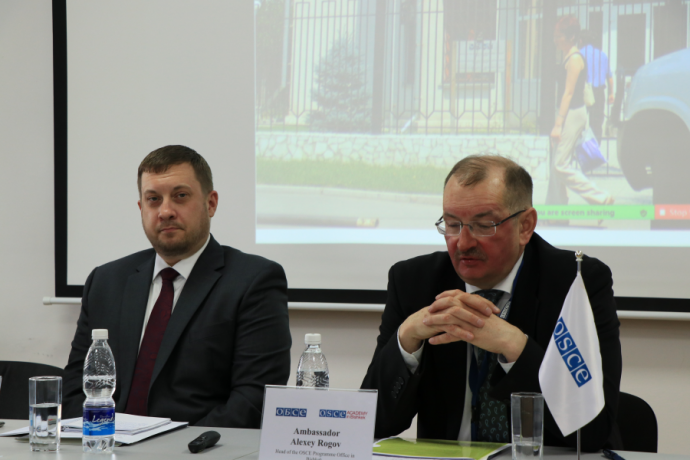News
Head of the OSCE Programme Office in Bishkek and Head of the Human Dimension Department delivered a Guest Lecture at the OSCE Academy
On 23 March 2022, the OSCE Academy hosted the lecture ‘Challenges to preventing and countering VERLT in Central Asia and the OSCE Programme Office in Bishkek’s relevant projects and activities’ delivered by Ambassador Alexey Rogov, Head of OSCE Programme Office in Bishkek (POiB), and Mr. Nicholas Mazik, Head of Human Dimension Department. This lecture was a part of the course ‘Contemporary Security Issues’ taught by Dr Elena Zhirukhina within MA Programme in Politics and Security.
Ambassador Rogov presented to students the conceptional and legal frameworks of countering violent extremism and radicalization that lead to terrorism (VERLT), as well as familiarized them with a rich portfolio of activities conducted by the POiB to address this and other issues. The technical assistance and capacity building activities, highlighted by Ambassador Rogov, included the projects focused on promoting the Advance Passenger Information (API) and Passenger Name Records (PNR) systems to enhance security at borders and international cooperation; on strengthening the Anti Money Laundering (AML) efforts, and, especially, countering the financing of terrorism; on establishing mechanisms to counter hate speech online; on preventing radicalisation in prisons and reintegrating ex-prisoners in their respective societies. Ambassador Rogov also shared with students the overview of terrorism evolution, including accounts of various terrorist motivations, ideologies, instruments, and tools.
Mr. Nicholas Mazik explored the connection between terrorism and illicit drugs trafficking, particularly, the phenomenon of ‘narcoterrorism,’ and elaborated on various types of alliances and cooperation between terrorist groups and transnational organised crime. The nexus between terrorism and organised crime is a growing challenge for the governments across the world, explained Mr. Mazik. He also familiarised students with the POiB activities on strengthening the rule of law, and promoting compliance with human rights regimes while countering VERLT, as well as monitoring of pre-trial detention and conditions in prisons.



 Русская версия
Русская версия